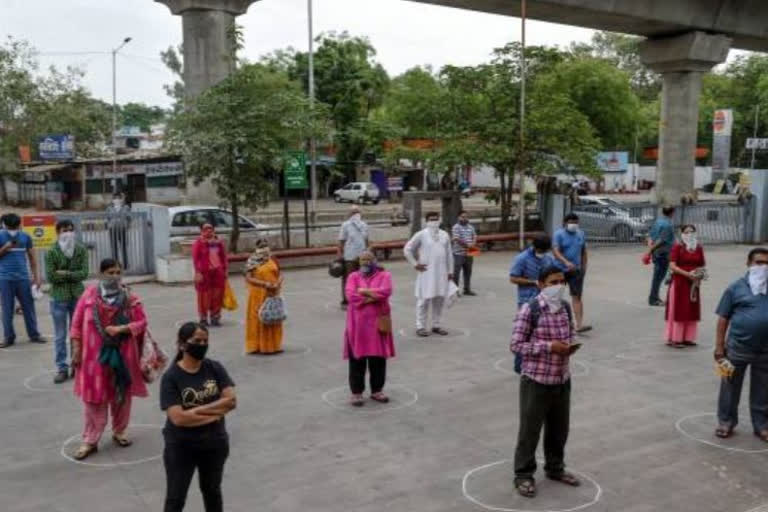New Delhi: The ever-active life cycle of humanity has come to a standstill with the sudden emergence of the Corona epidemic stumbling block. On the lines of Spanish-Flu which enslaved the entire world a century ago, COVID-19 has affected more than 12 lakh people and killed 65,000 world-over, and has extended to 211 districts in our country.
Out of the fear for the human tragedy that COVID can create, many countries including India, have announced lockdown to prevent the Corona outbreak. In line with the World Health Organization's view that lives are more important than the livelihood, they preferred economic setback to loss of life.
In developing countries such as India, the vast majority of the poor eke out living on daily wages. With the three-week lockdown resulting in disruption of daily necessities supplies, the suffering of different sections of Indian society is deplorable.
ALSO READ | PM Modi calls Australian counterpart; shares experience to deal with coronavirus
India is home to nearly 54 crore livestock. 23 per cent small farmers of the country are entirely dependent on them for their livelihood. The obstacles to their grazing and sales of their dairy products due to the lockdown are a big challenge. Though 18 million 80 lakh tonnes of milk is produced per day in the country, the inability to reach the product to the supply points is affecting the nation's economy and people's health.
The same is the situation with the poultry and aqua industry. The Delhi Wholesale Traders Association has forewarned that in the days to come, daily necessities like milk, vegetables, food grains edible oils, medicines, and consumer goods are likely to be in short supply. The Centre has announced that there are no restrictions on the supply of daily necessities.
The merchants' association has made it clear that the shortage of labour and the limited number of transport vehicles is the main reason for the delay in reaching supplies to the stores across the country, while the delay in the issuance of curfew passes is another hindrance. It is a problem with all the cities and towns across the country. Governments should focus on quickly solving these problems.
The transport and logistics sector is worth Rs 15 lakh crore in India and is very crucial for its economic development. 53 lakh trucks, 7,400 goods trains, and cargo planes are actively involved in the transportation of various products. The manufacturing sector accounts for about 60 per cent of road transport, while 10-15 per cent in infrastructure and export-related.
With the announcement of lockdown on the 24th of last month, these two sectors were completely shut down and the trucks stopped wherever they were. Though the centre gave a green signal for transportation of essential commodities and products, due to the stalemate in key sectors, factories and warehouses were shut down. As the drivers were unable to move out in fear of Corona, the supply chain of raw materials and finished products were cut off.
ALSO READ | Some places in India have turned into COVID-19 hotspots: AIIMS Director
Transporters demanded two-way charges even for one-way trip...cost of production increased. During any emergency, there is always an avaricious business community ready to black market and make undue profits! Unable to transport to the market yards the crop raised through sweat and hard work throughout the year, the heartbroken farmers left the entire produce in the farms incurring heavy loss.
The poultry industry is affected due to a shortage of soybean feed from Maharashtra and Madhya Pradesh and transport disruption between districts has hampered local maize supply. Five lakh trucks are parked on the highways, along the interstate borders. Governments should ensure the transportation of all essential commodities to their destinations on war footing to eliminate shortages and also protect the farmers' interests during rabi and kharif seasons.
It is estimated that India loses $800 million every day during the lockdown. Over the course of three weeks, the country has directly witnessed a financial loss of Rs.12 and a half lakh crore rupees in addition to the loss of employment, hardships to daily wage workers, difficulty in the supply of essential commodities, and the problems of migrant workers. Governments are preparing a second phase national strategy of identifying geographically the present danger zones (hotspots) and taking stringent steps of locking them down.
ALSO READ | President, PM, MPs to take a pay cut to fund govt's efforts to fight COVID-19
Whenever the lockdown is eased in other places, strict action must be taken to ensure the availability of the essential commodities. The horticulture farmers have a predicament of their own. Though there is a product of 40 tonnes grape readily available on the farm, he still faces the problem of his 40 lakhs loan in the banks -- the reasons are non-availability of farm labour to reap the produce and the problems of selling. The National Seed Association of India has made it clear that seed sales are difficult in the Kharif season as the refining and packing have stopped. If the import of basic medicines from China is stopped for long, there is a risk of a shortage of medicines locally. The international and inter-state restrictions on imports and exports must be relaxed so that the daily life of citizens is not disturbed.
While taking stringent steps to arrest and eliminate Corona, proper action must be initiated to put the economy back on track.
ALSO READ | US repatriates 1,300 Americans from India: Official



